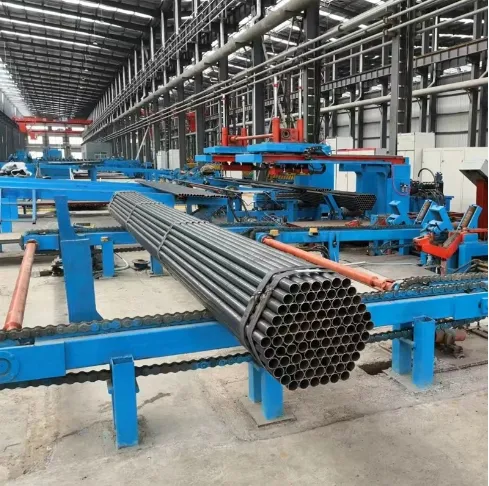Welded Pipe Equipment and Line Pipe Manufacturing
The global demand for pipelines and related products has spurred advancements in welded pipe equipment and increased the capabilities of line pipe manufacturers. Whether for transporting oil, gas, or water, pipeline systems rely on high-quality pipe line products to ensure efficiency and durability. This article delves into the technologies, applications, and benefits of welded pipe equipment and related pipeline solutions.

What is Welded Pipe Equipment?
Welded pipe equipment refers to the machinery and tools used to fabricate welded pipes, which are created by bending metal sheets into a cylindrical shape and welding the edges together. These pipes are widely used in industries such as construction, energy, and infrastructure due to their strength, reliability, and cost-efficiency.
Key Components of Welded Pipe Equipment
Pipe Forming Machine
- Shapes flat metal sheets into cylindrical forms.
Welding Unit
- Ensures precise welding of the pipe’s seam, commonly using high-frequency or submerged arc welding.
Sizing and Shaping Equipment
- Adjusts the pipe to meet exact dimensions and tolerances.
Cutting Machines
- Cuts pipes to specified lengths with high precision.
Inspection Systems
- Uses ultrasonic or X-ray methods to check the integrity of welds and ensure quality control.
Types of Welded Pipes Produced
Longitudinal Welded Pipes
- Edges are welded along the length. Common in construction and water transport.
Spiral Welded Pipes
- Made by welding spirally coiled steel strips. Ideal for large-diameter applications like oil and gas pipelines.
Double Submerged Arc Welded (DSAW) Pipes
- Known for their strength, these pipes are used in demanding environments such as offshore oil rigs.
Line Pipe Manufacturers and Their Role
A line pipe manufacturer specializes in producing pipes designed to transport liquids and gases under pressure. These manufacturers rely on advanced equipment and strict quality standards to produce pipes suitable for pipelines, ensuring safety and efficiency.
-
Materials Used: Steel is the most common material due to its strength, durability, and resistance to pressure.
-
Standards Compliance: Products must meet international standards like API 5L, ASTM, or ISO to guarantee reliability.
Applications of Welded Pipe Equipment and Line Pipes
Oil and Gas
- Line pipes transport crude oil, natural gas, and refined products across long distances.
Water Distribution
- Used for municipal water supply and irrigation systems.
Construction
- Structural welded pipes are used in building frameworks, bridges, and industrial facilities.
Energy
- Pipes transport steam and other fluids in power plants.
Chemical Industry
- Specialized pipes handle corrosive materials and high-temperature substances.
Advantages of Welded Pipe Equipment
Efficiency
- Enables high-speed production, meeting large-scale demands.
Cost-Effectiveness
- Welded pipes are generally less expensive than seamless alternatives.
Versatility
- Can produce pipes in various diameters and lengths for different applications.
Quality Assurance
- Modern equipment ensures precise welding and thorough inspection for reliable performance.
Pipe Line Products and Their Benefits
Pipe line products include fittings, valves, and accessories that complement pipeline systems. These components ensure the proper functioning, safety, and maintenance of pipelines.
Fittings
- Elbows, tees, and reducers allow pipelines to navigate complex layouts.
Valves
- Control the flow of liquids and gases, enhancing safety and efficiency.
Coatings and Linings
- Protect pipes from corrosion and environmental damage, extending their lifespan.
Challenges in the Industry
Material Costs
- Fluctuating prices of steel and other raw materials impact production costs.
Environmental Regulations
- Compliance with stringent regulations can increase operational complexity.
Technological Upgrades
- The need for continuous investment in advanced equipment to stay competitive.
The role of welded pipe equipment, line pipe manufacturers, and related pipe line products is critical in building robust and efficient pipeline systems. These technologies continue to evolve, offering better performance, reliability, and sustainability. Businesses aiming to invest in pipeline infrastructure should prioritize quality equipment and trusted manufacturers to ensure long-term success and safety.


